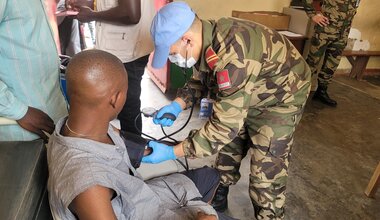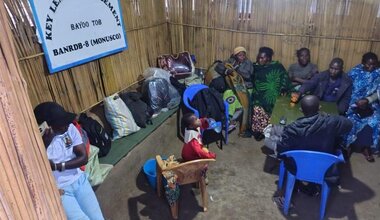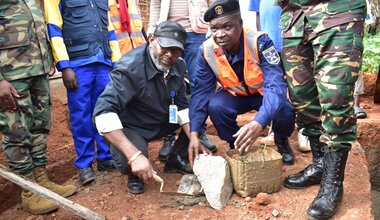HIV sensitization at the centre of Women’s Day commemoration in Goma
Goma, 13 March, 2016 - Activities to mark this year’s International Women’s Day, commemorated under the theme Planet 50-50 by 2030: Step It Up For Gender Equality, have continued to spread to all parts of the Democratic Republic of the Congo (DRC), days after global commemorations were held on Tuesday, 8 March, 2016.
In the North Kivu Province, MONUSCO held a huge event to celebrate acts of courage and determination by ordinary women who have played extraordinary role in the history of their communities and who have continued to play an important part to reshape the political landscape of most nations all over the world.
The event that was chaired by North Kivu Deputy Provincial Governor brought together numerous dignitaries and Associations involved in women affairs. Also present at the ceremony was MONUSCO’s representative who read the speech of the United Nations Secretary-General, Ban Ki-Moon to the people of North Kivu. These dignitaries joined the entire population of the province to celebrate this day, which also created space to project the plight of women at every level of daily life.
With the assistance of some Sections of MONUSCO like Gender Advisory, Child Protection, HIV/AIDS, the Mission’s Leadership has always shown its continuous commitment to achieving gender equity and justice in the DRC through awareness and educative activities.
Organized by the Gender Advisory Section with the help of other Sections of MONUSCO, UN Agencies, Civil Society, International Non-Governmental Organizations, and in collaboration with the North Kivu Provincial Ministry of Gender, the highly attended event was an ideal sensitization and educative venue for various Women and Students’ Associations.
The remarkable presence of the HIV/AIDS Section of MONUSCO and UNAIDS opened a door for massive sensitization of the population. The major targets were women, girls, and students of various Universities situated in and around Goma.
Assisted by the Association of Female Doctors in Goma (AFEMED), Association of People Living with HIV (UCOP+), and dozens of University students, not only girls and women were sensitized on the issues of HIV and AIDS but also the entire population that turned out for this great event. This impressive collaboration made the rendering of Voluntary, Confidential Counselling and Testing (VCCT) easier as so many people lined up for HIV test.
Although Women’s Day enables women to reflect on progress made in all spheres of their daily lives, the HIV/AIDS Section took advantage of the day to raise awareness about how women and girls can protect themselves from contracting HIV - which, without proper treatment and care often leads to AIDS.
It is obvious that HIV and AIDS affect both men and women, but findings have shown that women are most affected. In much of Sub-Saharan Africa the impact of HIV and AIDS on women and girls is a disturbing issue. Studies say this is due, in part, to gender roles within society. In some communities around the world the responsibility of caring for AIDS patients and the burden of looking after vulnerable children and those orphaned by AIDS are often relegated to women.
Addressing gender issues remains critical to achieving an HIV-free community, a commitment recently made by the Special Representative of the United Nations Secretary-General in the DRC, Maman Sambo Sidikou. In a statement made public in the Congolese capital, Kinshasa on the occasion of this year’s International Women’s Day, the Head of MONUSCO reminded the Congolese government and its people of his commitment to support them to achieve gender equality goal.
This achievement cannot be possible without addressing the issue of HIV and AIDS. It is for this reason that the HIV/AIDS Section saw this event as a great opportunity to educate women and girls about the importance of HIV prevention as well as its impact on the family and society as a whole.
By Joseph Tabung Banah
 UN
UN United Nations Peacekeeping
United Nations Peacekeeping






